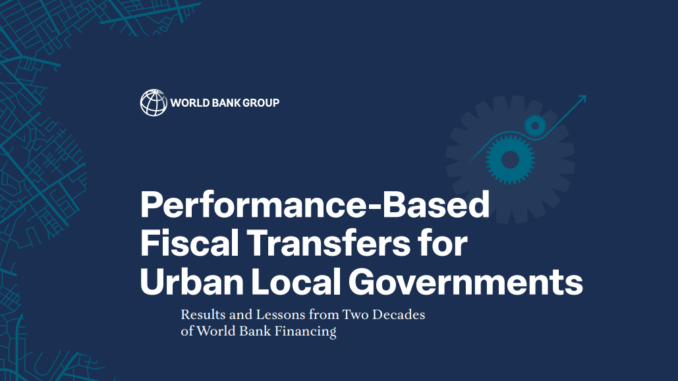
The ability of cities and municipalities to effectively deliver infrastructure and services and productively manage built environments and local economies depends on their institutional capabilities, quality of local governance, and financial resources at their disposal. Therefore, a core priority of governments is to strengthen the financial and institutional systems for cities and municipalities to enable them to perform these functions.
One tool the World Bank has used to address this challenge over the past two decades is performance-based fiscal transfers to urban local governments – a type of financing mechanism designed to improve institutional and service delivery performance of these local governments.
Generally known as ‘Urban Performance Grants’ (UPGs), these are fiscal transfers from a higher level of government conditioned on achieving performance in predetermined areas. The Bank’s Global Practice for Urban, Disaster Risk Management, Resilience and Land has implemented a large financing portfolio of such programs across several countries. Urban Performance Grant programs generally have the following key design features:
- UPGs use performance-based grant financing to provide incentives to local governments to improve their institutional performance and service delivery outcomes in their jurisdictions.
- The programs rely on a robust, credible, and transparent common annual performance assessment (APA) system to evaluate local governments based on established criteria. The results of the assessments form the basis for the fiscal transfer (grant) allocations to these local governments, which receive grants from a central or regional agency, such as the Ministry of Finance, on the achievement of predefined result targets.
- Grant funding is generally used for capital investments (infrastructure and service delivery). The investments are measured and reported on, but the participating local governments have discretion over them, within limits, in line with local plans and priorities.
- Capacity-building support is provided to different tiers of government. Both the central government agency or ministry administering the program and the recipient local governments receive this support, which is sometimes delivered to the latter through earmarked capacity-building grants and is typically closely linked with the results of the performance assessment system.
- UPG programs generally cover multiple cities, municipalities, and urban local governments. In some cases, however, a single large city or metropolitan area may be targeted for specific purposes. Urban as well as rural local governments may be grant recipients, depending on program objectives and the specific political, administrative, and institutional context.
A recent report from the World Bank (Performance-Based Fiscal Transfers for Urban Local Governments : Results and Lessons from Two Decades of World Bank Financing) takes stock of the results and implementation experience of these programs and identifies key lessons and good practices for the design of the next generation of such programs.
Based on a review of nine financing programs across seven countries (Ethiopia, Ghana, India [West Bengal], Kenya, Tanzania, Tunisia, and Uganda), the report shows that Urban Performance Grants have generally been effective in delivering results in line with their development objectives and have improved the delivery of urban infrastructure and service delivery in their targeted areas. The report concludes by providing guidance on improving the sustainability of these programs within country systems and promoting local action for climate change mitigation and adaptation.
Lee, Hyunji; Athar, Sohaib; Steffensen, Jesper; White, Roland; Mahgoub, Ayah. 2022. Performance-Based Fiscal Transfers for Urban Local Governments : Results and Lessons from Two Decades of World Bank Financing. World Bank, Washington, DC. © World Bank Group. https://openknowledge.worldbank.org/handle/10986/38342 License: CC BY 3.0 IGO.



